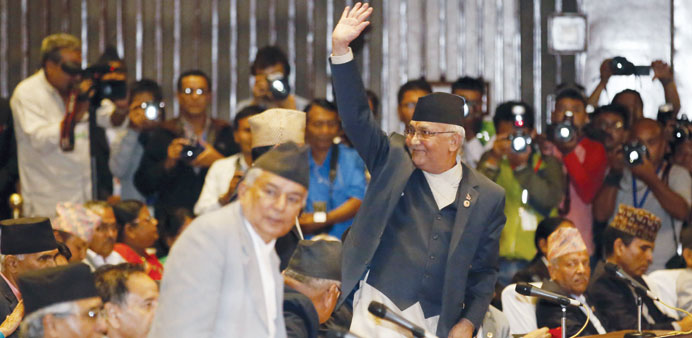Khadga Prashad Sharma Oli, also known as KP Oli, centre, waves towards the constitution assembly members after being announced as Nepal’s 38th prime minister in Kathmandu yesterday.
AFP
Kathmandu
Nepal’s parliament yesterday elected communist leader KP Sharma Oli as the new prime minister, tasked with unifying the quake-hit country after a new constitution triggered deadly protests, a border blockade and a nationwide fuel shortage.
Oli, of the Communist Party of Nepal (Unified Marxist Leninist), defeated by 338 votes to 249 former premier Sushil Koirala, who had stepped down from the top job as required by the constitution adopted on September 20.
“Today I have been elected as the prime minister. I take this as an opportunity, an honour and a challenge,” Oli told reporters as he left parliament, where his victory was greeted by cheers from lawmakers.
Oli is tasked with quelling protests over the new constitution and ending the blockade which has led to national fuel rationing, as well as pushing ahead with reconstruction after the earthquake in April killed
thousands.
He is known as a moderate conservative within his party despite its communist leanings, and vowed yesterday to work with other parties to develop the impoverished country.
“My request is that all the parties must work together and move forward in consensus,” Oli told lawmakers in an address
before the vote.
“There are groups that are dissatisfied with the constitution. We have to address their demands,” said Oli.
“Our country has been devastated by the earthquake. I will accelerate the reconstruction process,” the 63-year-old also said.
The current government is accused of stalling on rebuilding after the quake killed nearly 9,000 people and left more than half a million homeless.
The constitution is aimed at bolstering the Himalayan country’s transformation to a peaceful democracy after decades of political instability and a
civil war.
After years of bickering about the document, the quake spurred the main political parties into agreement on it.
But the constitution, the first to be drawn up by elected representatives, triggered a blockade by protesters at a vital border checkpoint, cutting off fuel supplies from sole provider India and sparking a nationwide shortage.
Protesters from Nepal’s southern plains are incensed about the planned division of the country into several federal provinces.
More than 40 people have been killed in clashes between police and the protesters representing ethnic minorities, who say the new federal structure will leave them under-represented in parliament.
The historically marginalised groups include the Madhesi and Tharu minorities, who mainly inhabit the southern plains, along the border with India.
The constitution is the final stage in a peace process that began when Maoist fighters laid down their arms in 2006 after a decade-long insurgency aimed at abolishing the monarchy and creating a more equal society.
During his speech to parliament, Koirala, from the main Nepali Congress party, pledged to work with Oli if he lost the vote.
But political commentator Ajaya Bhadra Khanal said the tough-talking Oli faces enormous challenges in the coming months.
“On a personal level, he has developed antagonism with many people, including Madhesi leaders. It will be a challenge for him to negotiate within that circle and bring all political forces to work together,” Khanal said.
“He has his work cut out for him because he has been the reason why this divisive constitution went through,” said political commentator Kunda Dixit.
“You can’t be a healer when you are the one who created the wound.”
When he was 21, Oli was jailed for 14 years for leading a communist underground movement to overthrow King Mahendra’s absolute rule.
After his release from prison, he married party worker Radhika Shakya and joined the Communist Party of Nepal (Unified Marxist-Leninist). Known as a tough talker, he rose through the ranks to become deputy leader of the opposition in parliament in 1999.
Oli lost the seat he had held since 1991 in parliamentary elections in 2008, when the former Maoist rebels entered politics and swept the polls with a wave of public support.
But the Maoists, who abolished the monarchy, struggled to hammer out an agreement on the constitution and Oli bounced back in 2013, when fresh elections saw his party come a close second to the Nepali Congress.
Commentators credit him with securing the cross-party deal in June on the long-delayed constitution.
But they warn he may struggle to contain the anger still simmering across Nepal’s plains, where protesters have enforced a blockade at a key border checkpoint, cutting off vital fuel supplies to the landlocked country.
Oli, who secured his party’s top job last year, openly scorned the protester’s demands for a separate province and greater autonomy for their community.
“Identity is a treacherous wordplay. It is a cunning game to ignite social disharmony in
Nepal,” he said.
Yesterday, he struck a more conciliatory note, telling lawmakers protesters’ needs should be addressed.
Oli will also have to mend ties with giant influential neighbour India, which is worried about instability on the border and has expressed concerns over the constitution.
Oli has accused India of being behind the blockade that started on September 24 to protest against the charter.
As trucks remain stuck at the frontier, Nepal has been forced to ration supplies nationwide as long lines form at petrol stations.
India has denied involvement in the blockade and instead urged all parties to enter talks to resolve the crisis.
Indian Prime Minister Narendra Modi, in a tweet, said he had spoken to Oli and congratulated him on his victory.

